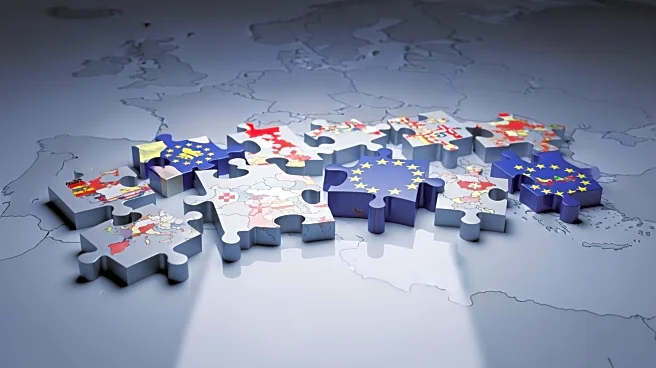What's Happening?
The European Union (EU) represents an unprecedented experiment in sovereignty sharing among its member states. Formed after World War II, the EU has evolved into a complex political and economic union
where countries have pooled their sovereignty to a significant extent. This arrangement allows for a single market, a visa-free Schengen zone, and coordinated labor laws, among other benefits. The EU negotiates trade deals as a bloc, providing its members with greater leverage in global markets. The concept of sovereignty sharing has been a contentious issue, as seen in the UK's decision to leave the EU, known as Brexit, which was driven by a desire to regain control over national policies.
Why It's Important?
The EU's model of sovereignty sharing has significant implications for international governance and cooperation. By pooling sovereignty, EU member states can achieve greater economic integration and political stability. This model challenges traditional notions of national sovereignty and has influenced other regional organizations. The EU's ability to balance national and collective interests is crucial for its continued success and serves as a potential model for other regions seeking deeper integration. The EU's approach to sovereignty sharing also impacts its ability to address global challenges, such as climate change and international trade disputes.
What's Next?
The EU will continue to navigate the complexities of sovereignty sharing as it addresses internal and external challenges. Debates over the extent of integration and the balance of power between national governments and EU institutions are likely to persist. The EU's response to global issues, such as climate change and economic recovery, will test its ability to act collectively. Additionally, the EU's expansion efforts and its relationship with non-member countries will be key areas of focus. The bloc's ability to maintain unity and promote cooperation will be critical to its future success.
Beyond the Headlines
The EU's experiment in sovereignty sharing raises important questions about the future of international governance. The bloc's approach to integration and cooperation could influence other regions considering similar models. The EU's ability to address global challenges collectively highlights the potential benefits of regional cooperation. However, the bloc must also address concerns about democratic accountability and the balance of power between national and supranational institutions.










